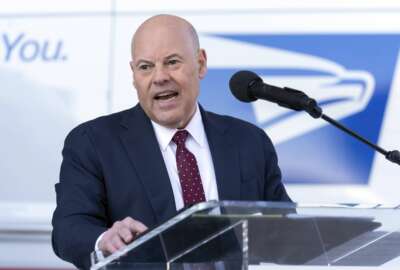USPS rural carriers union says members have more to lose than gain in decertification push
Several thousand Postal Service rural carriers have expressed an interest in leaving their union, after most of them saw pay cuts under a new pay system.
Several thousand Postal Service rural carriers have expressed an interest in leaving their union, after most of them saw pay cuts under a new pay system.
But the union’s new national president is urging caution, and telling its members that a new union won’t mean a better deal for rural carriers.
A grassroots network of rural carriers is collecting signatures from their coworkers, in the hopes of decertifying the National Rural Letter Carriers Association, (NRLCA) which counts 127,000 rural carriers as its members.
Rural carriers behind the decertification effort told Federal News Network that the union didn’t do enough to keep USPS from implementing a new pay system that’s been in the works for more than a decade.
But NRLCA National President Don Maston said in an interview Friday that the union had “gone to extreme measures,” and delayed the rollout of the Rural Route Evaluated Compensation System (RRECS) several times to train and educate members on the new system.
“The union, I assure you, has been working day and night – countless hours, a lot of sleepless nights on this RRECS – trying to make sure that it’s the most fair and accurate way to evaluate routes,” he added.
Maston confirmed that about two-thirds of rural carriers saw pay cuts under RRECS. But he said that those losses are distributed over a bell curve — meaning that only a small percentage of rural carriers saw either a significant gain or loss in pay.
“Some may have stayed the same, some may have lost an hour. Some may have lost two hours, [but] it was not everybody lost 10 hours — and that’s kind of getting lost in the news, that everybody didn’t lose excessive amounts,” he said.
NRLCA delayed USPS from implementing RRECS last September, and postponed the rollout again this April.
“We put a stop to it, because we were we were seeking information, we were seeking to make things better, and get everything so we were confident it was working correctly,” Maston said.
Maston said industrial engineers hired by the union have been “constantly reviewing the data” – millions and millions of data points in RRECS – and taking steps to ensure the new system is working properly.
But those delays also exacerbated the shock rural carriers felt with RRECS finally went into effect in May.
“The hit that some carriers took was hard. It was more than it would have been, if it had been done over a period of time. But that also took longer, because we had to make sure that everything was fair and accurate,” Maston said.
Prior to the RRECS rollout, rural carriers were paid based on a five-year-old snapshot of mail volume data, which didn’t account for a persistent decline in mail volume over those years.
“That’s not to say that we aren’t empathetic on a human level. People get used to making a certain salary and getting off at a certain time. And it was a great system for that five years, especially with a decline in mail volume,” Maston said. “They didn’t have a lot of work to do, and they’re getting off early and getting a very nice salary. But the system was designed to pay carriers for what they actually do, and be fair to the employer and the carriers alike, but still have a substantial incentive built in there.”
Unlike city letter carriers and city carrier assistants, rural carriers are paid based on how long it takes to complete their route and how much mail and packages the route receives.
Maston said rural carriers on average lost about 2.8 hours from their routes after RRECS went into effect. He said that loss accounts for ongoing declines in mail volume, as well as Amazon delivering more of its packages on its own.
Maston added that roughly 30% of rural carriers working more hours than their route evaluation, sometimes as the result of a surge in packages on their route, “were begging for the [RRECS] system to be put into place.”
“We told people, from the beginning of this, that there were going to be new winners and new losers emerge, redistribution of the hours. When people say that everybody lost tremendous amounts of time and money, that’s not an accurate statement. In the bell curve, there are people in the middle, some didn’t change at all, some changed an hour or two.”
Postmaster General Louis DeJoy, in a recent memo, said USPS is “transforming the employee experience,” and pointed to the agency’s collective bargaining agreements as the best way for its workforce to navigate that transformation.
DeJoy, in an Aug. 18 memo, told USPS executives and managers that “our bond with our employees has never been more important than it is today,” and “that bond is represented by the collective bargaining agreements we have negotiated with our unions.”
“As we continue our transformation to meet the needs of a dynamic and changing business environment, we will, by necessity, continue to adapt to more change,” DeJoy wrote. “There is one aspect of our transformation that cannot change and that is our adherence to the provisions of our labor agreements.”
“It is our collective responsibility to build a stable and empowered workforce that will transform our employees’ experience. Respecting and abiding by the provisions of our collective bargaining agreements will help us achieve that objective,” DeJoy added.
RRECS is the product of arbitration between USPS and the NRLCA more than a decade ago after both parties failed to agree on how to design a new pay system on their own for rural carriers.
RRECS replaces a pay system for rural carriers that had been in place for about 50 years.
“I expect this one to be in place for — who knows how long? But decades, I would surmise,” Maston said.
Rural carriers have collected more than 7,400 signatures from their colleagues interested in decertifying the NRLCA — roughly 20% of the total needed for the National Labor Relations Board to hold an election and let rural carriers vote on whether to stay in or leave the union.
But Maston said rural carriers stand to lose more than gain through the decertification route.
“The collective bargaining agreement that we have, all of the benefits that we have gained over the years for rural carriers would just simply go away, it doesn’t just start over where we are under a different union or no union,” Maston said.
That collective bargaining agreement, he added, protects rural carriers from layoffs.
“The Postal Service could just simply make everybody at-will employees and get rid of them. So there are a lot of negative things that individuals aren’t looking at,” Maston said.
NRLCA will mark its 120th year anniversary in September, and has gone through other major changes in rural carriers’ compensation.
“I have every confidence that moving forward, RRECS will be the better solution to a snapshot in time under the old standards that we had, where everybody would have lost way more hours than we have now,” Maston said. “I expect that as people get used to this system, and do the work that they’re supposed to do, we will see an increase in route evaluations [but] it’s not going to the fix in mail volume.”
Copyright © 2025 Federal News Network. All rights reserved. This website is not intended for users located within the European Economic Area.
Jory Heckman is a reporter at Federal News Network covering U.S. Postal Service, IRS, big data and technology issues.
Follow @jheckmanWFED






